Baker Academic Commentary Collection (9 vols.)
Digital Logos Edition
Overview
The Baker Academic Commentary Collection presents commentaries on 16 biblical books, plus a one-volume commentary on the New Testament. It includes expositions from numerous noted scholars, including Robert H. Gundry, F.F. Bruce, Craig S. Keener, Leslie C. Allen, and more. Each volume is clear, accessible, and comprehensive, providing evangelical scholarship and presenting answers to interpretive challenges. The commentaries include the latest scholarship and integrate Scripture with contemporary application.
This title is included in the following collections
You can save when you purchase this product as part of a collection.
Baker Academic Biblical Studie...
$3,999.99$2,999.99Baker Ultimate Collection 2022...
$38,273.89$22,949.99

- Commentaries on 16 biblical books
- Contributions from highly-noted and respected scholars
- Perfect for scholars, students, and lay people alike
- Title: Baker Academic Commentary Collection
- Publisher: Baker Academic
- Volumes: 8
- Pages: 6,876
- Christian Group: Evangelicals
- Resource Type: Commentaries
- Topic: Biblical Studies
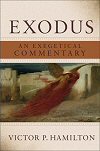
Victor Hamilton, a highly regarded Old Testament scholar with over 30 years’ experience in the classroom, offers a comprehensive exegesis of the book of Exodus. Written in a clear and accessible style, this major, up-to-date, evangelical, exegetical commentary opens up the riches of the book of Exodus. Hamilton relates Exodus to the rest of Scripture and includes his own translation of the text. This commentary will be valued by professors and students of the Old Testament as well as pastors.
Hamilton’s commentary on Exodus contains his own unique, detailed, and constructive translation and interpretations of the texts of Exodus fueled by a wide-ranging dialogue with a wealth of previous scholarship. A rich feast of theologically fruitful insights.
—Dennis Olson, Charles T. Haley Professor of Old Testament Theology, Princeton Theological Seminary
Victor Hamilton has produced an excellent commentary on the book of Exodus. It is clearly written as a useful reference for teachers, pastors, and students of the Bible. He provides his own translation and grammatical notes for each section, followed by an extended commentary that draws deeply on the best sources of a rich interpretive tradition. Evangelicals will find his references to related New Testament texts as well as contemporary comparisons to be helpful resources for teaching. This commentary is a valuable addition for anyone seeking to understand the foundational story of the emerging people of God in Scripture.
—James K. Bruckner, professor of Old Testament, North Park Theological Seminary
A substantial commentary on the second book of the Bible. Hamilton . . . offers a work that is exegetical and theological. The book bares all the fruit of decades of study invested in the book of Exodus.
—R. Albert Mohler Jr., president, Southern Baptist Theological Seminary
Victor P. Hamilton, now retired, was professor of Bible and theology at Asbury University in Wilmore, Kentucky, for more than 35 years. He is the author of a two-volume commentary on Genesis, Handbook on the Pentateuch, and Handbook on the Historical Books.
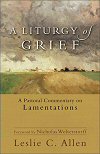
In Lamentations, we read of the unbearable grief experienced by a group of believers. Leslie Allen suggests the book can be read as the script of a liturgy performed to help the people of God come to terms with the fall of Jerusalem and the national catastrophe it entailed. It reveals God’s sometimes hidden support for those who grieve and for their caregivers. In this unique commentary A Liturgy of Grief: A Pastoral Commentary on Lamentations, respected Old Testament scholar and volunteer hospital chaplain Leslie Allen appropriates this oft-neglected book of the Bible to deal with a universal issue. Incorporating stories of pastoral encounters with hospital patients, Allen integrates Scripture and pastoral care to present a biblical model for helping those coping with grief.
A Liturgy of Grief is at one and the same time an important contribution to our understanding of and dealing with grief and an important contribution to our understanding of one of the supreme pieces of literature in the Old Testament. Take and savor!
—Nicholas Wolterstorff, Emeritus Noah Porter Professor of Philosophical Theology, Yale University
Leslie Allen combines his considerable skill as a biblical interpreter with his extensive experience as a hospital chaplain to explore the book of Lamentations for its profound resources for ministering to those who suffer grief. The result is an illuminating and compelling study that will help people who are in the throes of grief as well as those who support them.
—Tremper Longman III, Robert H. Gundry Professor of Biblical Studies, Westmont College
Realism. This is the desperate need for a church that has forgotten how to lament. Committed to celebration, it has few tools to articulate excruciating grief at a loss, to confess sin and accept divine judgment, or to express frustration with God in times of trouble. In the expert hands of Leslie Allen, Lamentations becomes a companion through the labyrinth that is the difficult, and sometimes sorrowful, pilgrimage of faith on the way to hope. We need this book.
—M. Daniel Carroll R., distinguished professor of Old Testament, Denver Seminary
Leslie Allen is no stranger to tears. He is a scholar of the Hebrew Bible whose exegesis is thoroughly tested week after week as he goes walking in hospital halls as a chaplain with a listening heart. His responses to grief well up from the empathic soul of a wounded healer who can point the way to the discovery of a holy hope. This is a book for the caregiver who loves thoughtful scholarship and for the scholar who, in loving people, has a heart for caregiving.
—David Augsburger, senior professor of pastoral counseling, Fuller Theological Seminary
Leslie C. Allen is senior professor of Old Testament at Fuller Theological Seminary. He has written several major Old Testament commentaries and has served as a hospital chaplain for more than a decade.
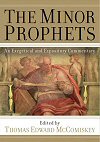
With their messages of doom and judgment, the Minor Prophets have not been popular subjects in the history of biblical interpretation. This volume, which now combines three volumes into one, remedies this neglect by offering an authoritative, evangelical treatment of the prophets. Here, noted scholars—including Bruce Walkte, Tremper Longman III, F.F. Bruce, J. Alec Motyer, and Joyce Baldwin—provide meticulous exegesis of the Hebrew text and relate the message of the ancient prophets to contemporary life in practical and meaningful ways.
In the commentary proper, the exegesis examines the Hebrew text in detail, interacts with current literature, and sets forth sounds conclusions. The exposition discusses related theological and hermeneutical issues, explains the flow of the prophetic narrative, and makes appropriate applications.
Preachers and teachers will find the ‘nuts and bolts’ analysis of the Hebrew text in this commentary to be helpful for their tasks.
—Review and Expositor
A worthwhile investment both for the interested and knowledgeable layperson as well as the intermediate-level student.
—Hebrew Studies
Overall, this is probably the best exegetical commentary on these books for the pastor’s study.
—Wisconsin Lutheran Quarterly
Although written from an evangelical perspective [this volume does not] shy away from critical questions, making it a useful book for both the academic scholar and the minister in the local congregation.
—Old Testament Essays
Its combination of attention given to technical and expositional issues makes it one of the best sets on this part of the Old Testament.
—Master’s Seminary Journal
A solid resource for both student and pastor. It provides a demonstration of what evangelical scholarship can do as it honestly wrestles with the text.
—Andrews University Seminary Studies
The information in this book will help in any serious study of an often neglected segment of the Bible.
—Bible Today
Thomas Edward McComiskey taught Old Testament at Trinity Evangelical Divinity School and was presiding fellow of the American College of Biblical Theologians prior to his death in 1996.
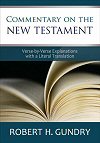
Commentary on the New Testament: Verse-by-Verse Explanations with a Literal Translation
- Author: Robert H. Gundry
- Publisher: Baker Academic
- Publication Date: 2010
- Pages: 1,100
Shouldn’t a Bible commentary clarify what God’s Word actually says? Going beyond questions of authorship, date, sources, and historicity, respected linguist and teacher Gundry offers a one-volume exposition of the New Testament that focuses on what is most useful for preaching, teaching, and individual study—what the biblical text really means. Providing interpretive observations in a “breezy” style that’s easy to read and adaptable for oral use in pulpit or classroom presentations, Gundry directs his book to an evangelical audience. His crisp translation of the New Testament inserts various phrasings of passages in brackets, allowing for smooth transition from original text to alternative and contemporary readings.
A magnum opus that reflects a life-long engagement with the text. . . . This volume will be a valuable resource for busy preachers and faith formation leaders who need reliable and accessible authority for their preparation, and it will likely be a useful starting point for lively discussion among scholars.
—Review of Biblical Literature
This is a great resource in a great format for a great purpose from a great scholar. Bob Gundry has been a treasure for people who love the Bible for many years, and this is one of his richest gifts to us yet.
—John Ortberg, senior pastor, Menlo Park Presbyterian Church, CA
Like having a wonderful tour guide to a foreign country, Gundry’s study of the New Testament introduces and guides one through the many joys and causes for reflection that are a part of a trip through the New Testament. The guidance provided is judicious in its choices of what to comment on and skilled in its presentation of the key ideas. It will surely serve well those who use it.
—Darrell Bock, senior research professor of New Testament studies, Dallas Theological Seminary
There is no better single-volume commentary on the New Testament than the one Bob Gundry has written. It offers succinct, fast-paced commentary, yet without neglecting the important points of interpretation. Busy pastors, students, laity, and even veteran scholars will find much in this commentary to appreciate. It belongs in every library and study.
—Craig A. Evans, Payzant Distinguished Professor of New Testament, Acadia Divinity College, Nova Scotia, Canada
This is not just another ho-hum commentary, the product of someone reading and repackaging previous commentaries. This is rather the fruit of a lifetime of close, intense attention to the text of the Greek New Testament; the upshot is that one happily finds on every page of this exegetical treasure fresh readings and independent judgments.
—Dale C. Allison Jr., Errett M. Grable Professor of New Testament Exegesis and Early Christianity, Pittsburgh Theological Seminary
Gundry’s magnum opus culminates the life’s work of one of our generation’s preeminent New Testament scholars. The weight of this commentary is matched by the substance of Gundry’s interpretation within its pages, reflecting his lifetime of scholarship. This one-volume commentary on the New Testament is a rare accomplishment that must find a place on the bookshelf of every serious preacher, teacher, and student of Scripture.
—Karen H. Jobes, Gerald F. Hawthorne Professor of New Testament Greek and Exegesis, Wheaton College and Graduate School
Robert H. Gundry is scholar-in-residence and emeritus professor of New Testament and Greek at Westmont College in Santa Barbara, California. He is the author of the bestselling classroom text XXX, now in its fourth edition.
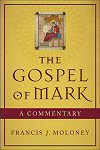
The Gospel of Mark, addressed to an early Christian community perplexed by failure and suffering, presents Jesus as suffering Messiah and Son of God. Recognizing that failure and suffering continue to perplex Christians today, world-renowned New Testament scholar and theologian Francis Moloney marries the rich contributions of traditional historical scholarship with the contemporary approach to the Gospels as narrative. This commentary combines the highest-level scholarship with pastoral sensitivity. It offers an accessible and thoughtful reading of Mark’s narrative to bring the Gospel’s story to life for contemporary readers.
Fr. Francis J. Moloney has given us a fine commentary on Mark that works on a number of different levels and therefore will be of use to a number of different audiences. The main part of the commentary, intelligible to any educated lay reader, sticks close to the text and story of Mark as it stands, providing a good sense of the overall story of Mark, with its own peculiar language, tone, structure, and theology. The numerous footnotes provide the more advanced reader with discussions of more detailed questions of history, traditions, sources, and modern-day debates among scholars. In sum, Fr. Moloney shows himself to be a first-class scholar and teacher.
—John P. Meier, William K. Warren Professor of Theology, University of Notre Dame
Moloney has provided the same detailed and thoughtful reading of Mark’s narrative that scholars familiar with his earlier work on John would expect. He incorporates the latest results of modern scholarship to show how carefully the evangelist has crafted a narrative out of earlier Jesus traditions. Based on the Greek text, this book provides a study of the Gospel for pastors, seminary students, and intermediate-level students.
—Pheme Perkins, professor of theology, Boston College
In his major commentary, F.J. Moloney succeeds in interpreting Mark’s Gospel at the highest scholarly level and also in a way that will be comprehensible to general readers. Moloney is one of those rare exegetes who is thoroughly familiar with the specialized literature on both sides of the Atlantic, so that this ranks as a truly ‘international’ commentary.
—Udo Schnelle, professor of New Testament, University of Halle-Wittenberg, Germany
Francis Moloney has written an insightful commentary on the Gospel of Mark that will serve readers well—scholars and laity alike. Readers are treated to judicious treatment of important issues and troublesome passages. Moloney has a knack for clarifying Mark’s goals and theological interests. This commentary is highly recommended.
—Craig A. Evans, Payzant Distinguished Professor of New Testament, Acadia Divinity College, Nova Scotia, Canada
Here is an accessible commentary by a great teacher. It combines historical and literary insights in a masterful way.
—Adela Yarbro Collins, Buckingham Professor of New Testament Criticism and Interpretation, Yale Divinity School
Francis J. Moloney is a senior professorial fellow of Australian Catholic University at its Melbourne campus, Australia, and member of the department of biblical studies. He is also the former provincial superior of the Salesians of Don Bosco for Australia and the Pacific region and former Katharine Drexel Professor of Religious Studies and dean of the School of Theology at the Catholic University of America. Moloney is a fellow of the Australian Academy of the Humanities, a member of the Order of Australia, and the author of more than 40 books, including The Living Voice of the Gospels and Mark: Storyteller, Interpreter, Evangelist. He is also a member of the editorial board for Paideia: Commentaries on the New Testament (7 vols.).
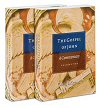
Craig Keener’s commentary explores the Jewish and Greco-Roman settings of John more deeply than previous works, paying special attention to social-historical and rhetorical features of the Gospel. This exhaustive commentary contains over 20,000 ancient extrabiblical references and cites about 4,000 different secondary sources, making it the most thorough and thoroughly documented John commentary currently available.
Keener’s new commentary on the Gospel of John represents a striking achievement in the history of Johannine scholarship. It is meticulously researched, cogently argued, and clearly presented, and will not soon be surpassed either in comprehensiveness or in depth. [It] belongs on the shelf of every student of the fourth Gospel.
—David E. Aune, Walter Professor of New Testament and Christian Origins, University of Notre Dame
This exhaustive commentary on the Gospel of John is an example of evangelical scholarship at its best. Keener relentlessly pursues all the possible sources for the Johannine story. The historical Jesus, early Christian tradition, and Palestinian, rabbinic, and the Mediterranean worlds are his regular points of extensive reference. Keener’s reading of the fourth Gospel as a story written for a rejected Jewish community, claiming they are the true Israel, and that Jesus is the perfection of the gift of Torah, raises questions that must be taken into account by future Johannine scholarship.
—Francis J. Moloney, Katharine Drexel Professor of Religious Studies, The Catholic University of America
Keener’s commentary is marked by intelligence as well as comprehensiveness. In the marshalling of relevant materials from John’s own milieu and in the canvassing of modern scholarly literature, Keener is unsurpassed in his generation of Johannine scholars. . . . Serious interpreters of the Gospel of John will not always agree with Keener’s conclusions, but they must take account of his work.
—D. Moody Smith Jr., George Washington Ivey Professor of New Testament, Duke University
Craig Keener’s academic commentaries are among the most important in print, because they not only summarize former scholarship but also add so many new insights from primary literature of the time.
—David Instone-Brewer, senior research fellow in rabbinics and New Testament, Tyndale House, Cambridge
Keener’s commentary on the Gospel of John is a work of stunning erudition. Aimed primarily at situating the Gospel in its intellectual, theological, and historical context, this monumental commentary cites an unparalleled array of ancient sources. Scholars will be mining its references and citing its interpretations for decades to come.
—R. Alan Culpepper, dean, McAfee School of Theology
Craig S. Keener is professor of New Testament at Asbury Theological Seminary in Wilmore, Kentucky. He is the author of many books, including Miracles: The Credibility of the New Testament Accounts, IVP Bible Background Commentary: New Testament, The Historical Jesus of the Gospels, Gift and Giver, and commentaries on The Johannine Writings, Matthew, John, Romans, 1–2 Corinthians, and Revelation.
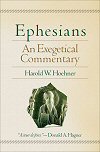
For the past 30 years, Harold Hoehner has trained thousands of seminarians in the art of New Testament exegesis. He now brings his skill and experience to this commentary on Ephesians—a commentary that no serious student can afford to ignore.
Hoehner begins with a helpful introduction to the letter of Ephesians in which he addresses issues of authorship, structure and genre, historical setting, purpose, and theology. At the end of the introduction, the author includes a detailed bibliography for further reading. Hoehner then delves into the text of Ephesians, verse-by-verse, offering the Greek text, English translation, and detailed commentary. He interacts extensively with the latest scholarship and provides a fair and thorough discussion of every disputed point in the book.
Pastors, students, and scholars looking for a comprehensive treatment on Ephesians will be interested in this commentary. Hoehner’s interaction with the latest scholarship combined with his detailed exegesis will make this new commentary the only resource they will need to consult.
This book tops the list of important new works on the crucial Epistle to the Ephesians. . . . None can challenge the erudition and sheer quantity of research that Hoehner demonstrates in this commentary. . . . It presents a model of careful exegesis from which any serious reader can profit.
—Journal of the Evangelical Theological Society
Hoehner has placed all students of Ephesians in his debt with this meticulous, exhaustive, and seasoned commentary on one of Paul’s richest letters. Hoehner’s interaction with the secondary literature on Ephesians is encyclopedic, yet he keeps his exegetical discussion focused and clear. The result is a commentary that no pastor or scholar can afford to be without.
—Frank Thielman, Presbyterian Professor of Divinity New Testament, Beeson Divinity School, Samford University
This thorough, thoughtful, and comprehensive commentary, the product of a lifetime of research and teaching, is marked by clarity, insight, and interaction with a broad array of scholarship. It is a ‘best buy’ that will fully repay the attention of all students of the New Testament.
—E. Earle Ellis, emeritus research professor of theology, Southwestern Baptist Theological Seminary
Hoehner’s Ephesians not only cites the best advice and information in standard works on this letter but also carefully sifts the evidence and offers judicious conclusions. All other commentaries can be put in storage for retrieval as needed.
—Frederick William Danker, emeritus professor, Lutheran School of Theology
I have anxiously anticipated this commentary since the early 1980s, and it is no disappointment. Hoehner has now produced the most detailed and comprehensive treatment of Ephesians ever written. The volume is well organized, clearly written, and very useful for in-depth study of the letter. It is now the indispensable standard for courses on Ephesians.
—Clinton E. Arnold, professor of New Testament language and literature, Talbot School of Theology
This is quite simply the most massive and meticulously detailed commentary on Ephesians to date—with the strongest defense of the case that the author was truly Paul and that the letter was indeed written to Ephesus. Virtually every textual, lexical, grammatical-semantic, and historical issue has been scrutinized and is informed by a comprehensive coverage of the vast relevant primary and secondary literature.
—Max Turner, emeritus professor of New Testament, London School of Theology
Harold W. Hoehner was the distinguished professor of New Testament studies at Dallas Theological Seminary, where he taught for more than 30 years. He is the author of Chronological Aspects of the Life of Christ.
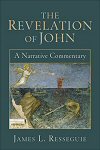
As the only book of its kind in the New Testament, Revelation presents interpretive challenges to scholar, student, pastor, and lay reader alike. For readers without specialized training, the historical-critical approach used in many commentaries can provide more complication than illumination. Further, that approach tends to de-emphasize the narrative aspect of the book.
In this new commentary, James Resseguie applies the easily understandable tools introduced in his primer on narrative criticism to this challenging biblical book. As he works his way through the text, Resseguie examines closely how Revelation uses such features as rhetoric, setting, characterization, point of view, plot, symbolism, and style to construct its meaning. This literary approach draws out the theological and homiletical message of the book and shows that Revelation is an organic whole with unifying themes. First, Revelation calls us to listen well. Second, the book stresses an overwhelmingly theocentric perspective we would do well to embrace. The third theme is that of an exodus of God’s people to a new promised land. Here is a valuable contribution to the study of Revelation in both the classroom and pastor’s study.
As its subtitle implies, James Resseguie’s ‘narrative commentary’ on the book of Revelation helps the reader follow in the footsteps of John the narrator. Much like John’s ‘interpreting angel’ within the book’s visions, the author allows us to hear what John heard and see what John saw, so that the sights and sounds of the book mutually interpret and enrich one another. In his hands, this last book of the Christian Bible becomes neither a coded account of first-century Roman politics nor a timetable of future events, but a story in its own right, a story of judgment and redemption to be heard afresh in every generation, not least our own. Highly recommended.
—J. Ramsey Michaels, professor of religious studies emeritus, Missouri State University
With great skill, Resseguie presents a unified reading of John’s Apocalypse as seen through the lens of narrative criticism in the grand tradition of Northrop Frye. The book provides not only careful discussion of major literary concerns but also a close reading of the text from beginning to end, a reading in constant dialogue with a wide range of scholars. This is a welcome addition to the growing body of work analyzing the Apocalypse as a narrative, and whether you find yourself agreeing or disagreeing on specific points, you will find a stimulating and well-argued commentary.
—David L. Barr, professor of religion, Wright State University
Revelation presents its vivid portrayal of God’s triumph over evil through a dynamic plot, memorable characters, and images that capture the imagination. James Resseguie’s narrative commentary invites contemporary readers to venture into Revelation’s literary world and to sense the transformative power of its text. Written in a clear and accessible style, this study helps readers see Revelation as a whole, guiding them through its scenes of cosmic conflict and into the New Jerusalem.
—Craig R. Koester, professor of New Testament, Luther Seminary
James Resseguie’s narrative commentary on Revelation will be hard to resist even amid the large selection of commentaries now available on this book. In addition to being nicely illustrated and very readable, this book brings the advantage of careful attention to John’s story. Where many commentators read the text of Revelation as though they know the story in advance, allowing their knowledge of the historical realities contemporary to the author to control interpretation, Resseguie leaves the author’s story in control. A case in point is his interpretation of the mysterious number 666, a fascinating test case for most interpretations. This commentary is a breed apart, and a welcome one at that.
—Sigve Tonstad, associate professor of religion and theological studies, Loma Linda University
James L. Resseguie is an emeritus distinguished professor of New Testament at Winebrenner Theological Seminary in Findlay, Ohio. He is the author of several books and articles, including Narrative Criticism of the New Testament: An Introduction and Spiritual Landscape: Images of the Spiritual Life in the Gospel of Luke.
Reviews
4 ratings

Ralph A. Abernethy III
9/7/2017

Maryellen J Lewis
12/8/2016
Mark Keith Hillis
2/19/2015
Very thorough and informative works. Certainly fits in well with other scholarship.
Logos User
12/21/2013
This needs to be unbundled. I understand the costs associated with bringing texts to print, but this is insane. At some point publishers and Logos need not peddle the Word of God.Bobby Terhune
10/18/2013

Whyndell Grizzard
7/25/2013
As much as I want the Hoehner on Ephesians the price is insane- tell Baker to keep it!!!David Vancelette
6/16/2013
F.F. Bruce was listed as an author in the main description. Which volume did he write??
Dan Phillips
6/14/2013
Odd that the McComiskey vol is dated 2009; the Master's review puts it in the 90s, with bibliographies no more recent than the 80s.